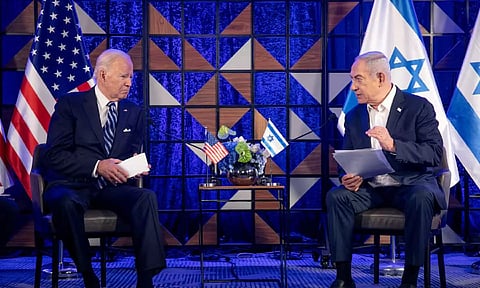

WASHINGTON: Relations between President Joe Biden and Prime Minister Benjamin Netanyahu sank to a wartime low on Monday with the U.S. allowing passage of a Gaza ceasefire resolution at the United Nations and drawing a sharp rebuke from the Israeli leader.
Netanyahu abruptly scrapped a visit to Washington this week by a senior delegation to discuss Israel’s threatened offensive in the southern Gaza city of Rafah after the U.S. abstained in a Security Council vote that demanded an immediate ceasefire between Israel and Hamas and the release of all hostages held by the Palestinian militants.
The suspension of that meeting puts a major new obstacle in the way of efforts by the U.S., concerned about a deepening humanitarian catastrophe in Gaza, to get Netanyahu to consider alternatives to a ground invasion of Rafah, the last relatively safe haven for Palestinian civilians.
The threat of such an offensive has increased tensions between longtime allies the United States and Israel, and raised questions about whether the U.S. might restrict military aid if Netanyahu defies Biden and presses ahead anyway.
“This shows that trust between the Biden administration and Netanyahu may be breaking down,” said Aaron David Miller, a former Middle East negotiator for Republican and Democratic administrations. “If the crisis is not managed carefully, it’s only going to continue to worsen.”
Biden’s decision to abstain at the U.N., coming after months of mostly adhering to longtime U.S. policy of shielding Israel at the world body, appeared to reflect growing U.S. frustration with the Israeli leader.
The president, running for re-election in November, faces pressure not just from America’s allies but from a growing number of fellow Democrats to rein in the Israeli military response to Hamas’ deadly Oct. 7 cross-border rampage that Israel says killed 1,200 people.
Netanyahu confronts domestic challenges of his own, not least his far-right coalition members’ demands for a hard line against the Palestinians. He also must convince hostages’ families he is doing everything for their release while facing frequent protests calling for his resignation.
As Netanyahu’s office announced the cancellation of the visit, he said the failure of the U.S. to veto the resolution was a “clear retreat” from its previous position and would hurt Israel’s war efforts.
PERPLEXED
U.S. officials said the Biden administration was perplexed by Israel’s decision and considered it an overreaction, insisting there had been no change in policy.
Washington had mostly avoided the word “ceasefire” earlier in the nearly six-month-old war in the Gaza Strip and had used its veto power at the U.N. to shield Israel as it retaliated against Hamas.
But as famine looms in Gaza and amid growing global pressure for a truce in the war that Palestinian health authorities say has killed some 32,000 Palestinians, the U.S. abstained on a call for a ceasefire for the Muslim holy month of Ramadan, which ends in two weeks.
The challenge now for Biden and Netanyahu is to keep their differences from escalating out of control, analysts say.
Jon Alterman, director of the Middle East program at the Center for Strategic and International Studies think tank in Washington, said there was no reason this should be a “mortal blow” to relations. “So I don’t think the door is closed to anything,” he said.
Signalling that the two governments remain in close communication, Israeli Defense Minister Yoav Gallant, on a visit separate from the one Netanyahu’s delegation scrubbed earlier, went ahead with high-level meetings in Washington on Monday.
But the U.S. abstention adds to a deepening rift between Biden and Netanyahu, who have known each other for years but have had a testy relationship even in the best of times.
Earlier this month, Biden said in an MSNBC interview that a Rafah invasion would be a “red line,” though he added that the defense of Israel is “critical” and there is no way “I’m going to cut off all weapons so that they don’t have the Iron Dome (missile defense system) to protect them.”
Netanyahu dismissed Biden’s criticism and vowed to press forward in Rafah, the last part of the Gaza Strip where Israeli forces have not carried out a ground offensive, though U.S. officials say there are no signs of an imminent operation.
That was followed last week with U.S. Senate Majority Leader Chuck Schumer, the country’s highest-ranking Jewish elected official, describing Netanyahu as an obstacle to peace and calling for new elections in Israel to replace him.
Biden called it a “good speech.”
But Republican House Speaker Mike Johnson told reporters on Wednesday he was thinking of inviting Netanyahu, who spoke by videolink to Republican senators last week, to address Congress. That would be seen as a jab at Biden, giving Netanyahu a high-profile forum to air grievances against the U.S. administration.
Democratic Senator Sheldon Whitehouse told Reuters that Netanyahu appeared to be working with Republicans to “weaponize the U.S.-Israel relationship in favor of the right wing.”
Biden’s 2024 re-election bid limits his options: he needs to avoid giving Republicans an issue to seize on with pro-Israel voters, while also halting the erosion of support from progressive Democrats dismayed by his strong backing for Israel.
Netanyahu, aware that polls show him being soundly defeated in any election held now, knows there is wide support for continuing the war in Gaza among an Israeli population still deeply traumatized by the Oct. 7 assault.
So he appears willing to risk testing Washington’s tolerance.
All members of Netanyahu’s emergency unity government support continuing the war until Hamas is destroyed and the hostages are returned, and there has been little sign of willingness to meet U.S. calls for moderation, despite the growing risk of international isolation.
Hard-right Finance Minister Bezalel Smotrich said Israel was a partner but the United States was not its “patron state”.